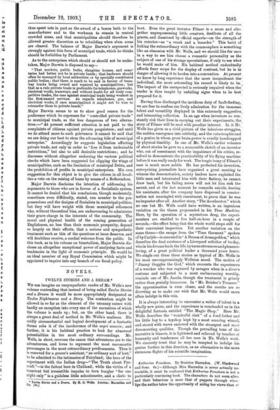NOVELS.
TWELVE STORIES AND A DREAM.•
WE can imagine an unsympathetic reader of Mr. Wells's new volume contending that instead of being called Twelve Stories and a Dream it would be more appropriately designated as Twelve Nightmares and a Story. The contention might be allowed in so far as the element of the uncanny enters with hardly an exception into every one of the narratives of which the volume is made up ; but, on the other hand, there is always a great deal of method in Mr. Wells's madness. His coldly circumstantial and logical development of a fantastic theme robs it of the incoherence of the aegri somnia ; and further, it is his habitual practice to look for abnormal potentialities in the most • ordinary surroundings. Mr. Wells, in short, reverses the canon that adventures are to the adventurous, and loves to represent the most unromantic personages in the most extraordinary predicaments. Thus it is reserved for a grocer's assistant, " an ordinary sort of lout," to be admitted to the intimacies of Fairyland; the hero of the experiment with the Indian drug—" The Truth about Pye- craft"—is the fattest bore in Clubland ; while the victim of a transient but irresistible impulse to turn burglar "for one night only" is a guileless little schoolmaster, and a cleric to - • Twelve Stories and a Dream. By H. G. Wells. London : Macmillan and Co. 1610 boot. Even the great inventor Filmer is a mean and alto- gether unprepossessing little creature, destitute of all the graces, and dismissed by official experts—on the strength of his exterior—as "a crank and a bounder." This habit of linking the extraordinary with the commonplace is something like an obsession with Mr. Wells, and we should like for once in a way to see him choose a romantic personality as the subject of one of his strange speculations, if only to see what he would make of him. His habitual method undoubtedly affords freer scope for the display of contrast, but he is in danger of allowing it to harden into &convention. At present we know by long experience that the more insignificant the individual, the more astounding his record is likely to be. The impact of the unexpected is seriously impaired when tbe reader is thus taught by unfailing signs when to be best prepared for it.
Having thus discharged the invidious duty of fault-finding, . we are free to confess our lively admiration for the immense talent and versatility displayed in this extremely suggestive, and interesting collection. In an age when inventors so con- stantly risk their lives in carrying out their experiments, the story of Finer will be read with peculiar interest. In it Mr. Wells has given us a vivid picture of the laborious struggles, the sudden emergence into celebrity, and the catastrophic end of a genius in whom great brain-power is cruelly handicapped by physical timidity. In one of Mr. Wells's earlier volumes of short stories he gave us a memorable sketch of an inventor . who, out of resentment with the impatience of his critics, re- solved to demonstrate the practicability of his flying machine before it was really ready for work. The tragic irony of Filmer's case is much more ,subtle. He has perfected his invention, enterprising journalists have organised a great meeting to witness the demonstration, society leaders have exploited the little man and intoxicated him with their flattery, he cannot draw back, but his failing nerve will not let him risk the ascent, and at the last moment he commits suicide, leaving his assistants, after the company have dispersed in conster- nation not unmingled with resentment, to prove that he was no impostor after all. Another story, " The Accelerator," which no one but Mr. Wells could have written, is an ingenious variation on the theme propounded in his Time Machine. Here, by the operation of a mysterious drug, the experi- menters are enabled to live half-an-hour in a couple of seconds,—the effect being that the whole world stops still for their convenient inspection. Yet another variation on the same theme—the escape from the "Time Garment" spoken of by Carlyle—is executed in " A Dream of Armageddon," which describes the dual existence of a Liverpool solicitor of to-day, who in his dreams leads the life, by turns strenuous and pleasure- loving, of a great political leader a thousand years hence. We single out these three stories as typical of Mr. Wells in his most uncompromisingly Wellsian mood. The motive of Jimmy Goggles the God," which recounts the experiences of a wrecker who was captured by savages when in a diver's costume and subjected to a most embarrassing worship, reminds one of Mr. Jacobs, though the treatment is grimly rather than genially humorous. In" Mr. Brisber's Treasure" the approximation is even closer, and the results are so diverting as to make one wish that Mr. Wells would more often indulge in this vein.
It is always interesting to encounter a writer of talent in a wholly new guise, and the experience is vouchsafed us in the delightful fantasia entitled "The Magic Shop." Here Mr. Wells describes the "wonderful visit" of a fond father and his little boy to a toyshop kept by a most amazing wizard, and stored with wares endowed with the strangest and most disconcerting qualities. Though the prevailing tone of the narrative is bizarre, it is lightened and relieved by touches of humanity and tenderness all too rare in Mr. Wells's work. We sincerely trust that he may be tempted to indulge his genius further in this direction, as an alternative to the more strenuous flights of his scientific imagination.


















































 Previous page
Previous page